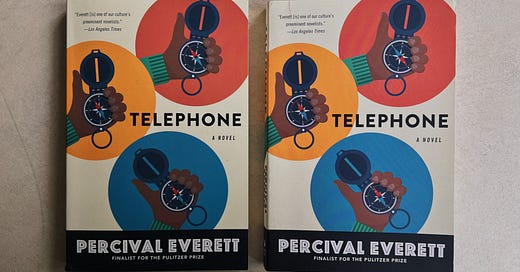Telephone by Percival Everett
How to Read and Analyse a Novel: Analysing the role of LANGUAGE
This post is part of a course I’m currently running for paid subscribers called How to Read and Analyse a Novel—we have now moved on to reading and discussing individual books! With each book, we are taking a particular topic or theme and exploring its role in the novel; this allows for a reading which is both focussed and comprehensive, helping you hone your analytical skills. Today we are looking at Percival Everett’s novel Telephone and how language and communication functions in the novel. For full introductory details and the reading list, start here. You can adjust your notification settings here if you would like to opt out of these emails.
Percival Everett’s novels always surprise me in some way. Just when you’ve relaxed into one mode—satire, literary realism, historical literary realism—he pulls the rug out from underneath your feet, and you find yourself in a very different novel indeed. Telephone is no exception. This is Everett at his most elegiac though; he paints a heartrending portrait of an unravelling family—an unravelling man—due to a child’s degenerative disease. But just when you think you are in one type of story, the strangeness of Everett’s world seeps in.
We follow Zach Wells, a grouchy middle-aged “geologist-slash-paleobiologist”. He’s tenured at a university based on his work on one particular cave in the Grand Canyon, on which he is the world expert. He is pretty dissatisfied with his life, but his close relationship with his daughter provides it with a meaningful centre. Sadly, he and his wife discover that she has an incurable degenerative disease, and his world (naturally) begins to fall apart. Whilst in and out of hospital waiting rooms, he notices something unusual: in a recently purchased pre-owned jacket pocket, he finds a note saying “help me” in Spanish. As his daughter’s condition worsens, Zach feels himself inexorably drawn towards the mystery of the note, and the person or people who wrote it.
Notoriously, this novel was originally published in three versions with slight differences, hence the title: it’s like a game of Telephone. How truthful is our narrator? What is he trying to tell us? What is lost in the translation of author to reader? Why do we shift gears into what feels like another story altogether? What do we make of the marriage of these two plotlines?





